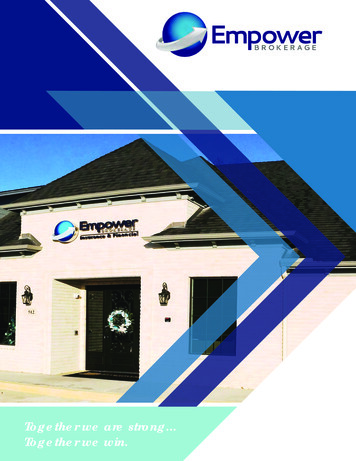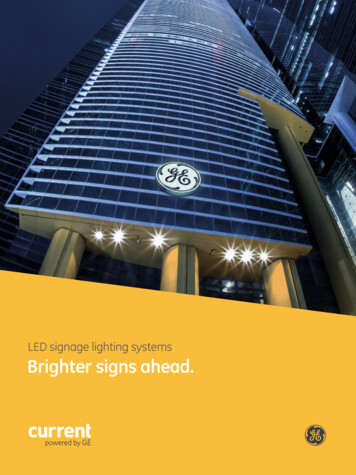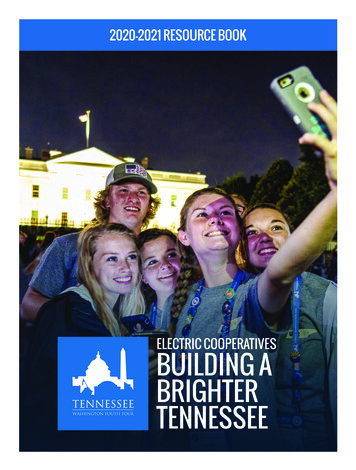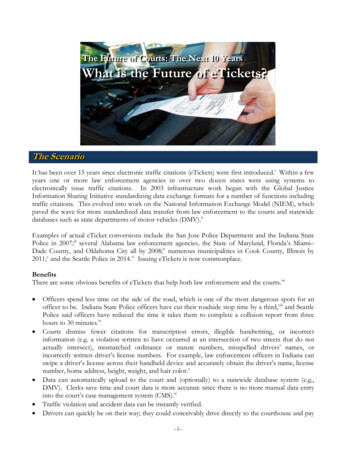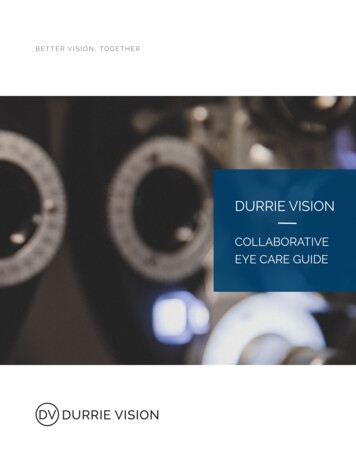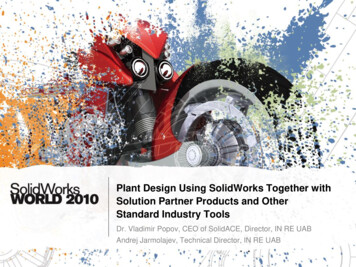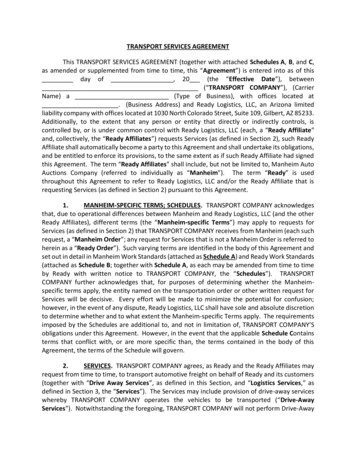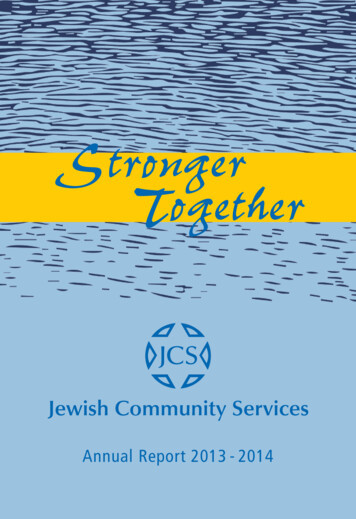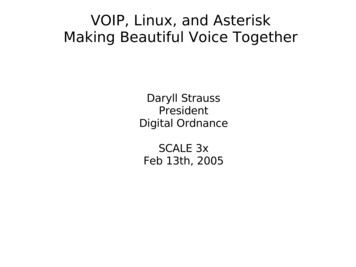
Transcription
2013 - 2014 SUSTAINABILITY reportTogether for aBrighter Future
Unilever 2013 - 2014 SUSTAINABILITY reportContent06 Sustainability Score Card66 Fairness In The Workplace08 Our Approach To76 Inclusive BusinessSustainability Reporting12 President Director Statement14 About Us26 Sustainability Governance38 Improving Health, Well-Beingand Nutrition52 ReducingEnvironmental Footprint84 Assurance Statement86 GRI Content Index89 The SR Winning Team
Unilever 2013 - 2014 SUSTAINABILITY reportTogether ForA Brighter FutureAt Unilever Indonesia, we are committed to sustainability in allaspects of our business. We recognize that Indonesia facessignificant challenges, notably poverty, health, nutrition, resourcesustainability, waste management, and climate change. UnileverSustainable Living Plan (USLP) is Unilever’s global initiative toaddress these challenges. Among the many activities inspired bythe Plan are hygiene campaigns to improve people’s health andwell-being; reducing the environmental footprint of our productsand operations; and improving the livelihood of millions of peoplethroughout our value chain. Unilever Indonesia is committed tomaking this Plan an intrinsic part of our daily work. By living ourPlan, we not only grow the company’s business but also help tomake life better for every Indonesian – joining hands and workingtogether for a brighter future.
2014 Sustainability Report
6PT Unilev er Indonesia TbkSUSTAINABILITY SCORECARDTargets and Achievements in BriefUNILEVER SUSTAINABLE LIVINGPLAN (USLP) AREAOBJECTIVESImproving Health And Well BeingReduce diarrheal & respiratorydiseases through hand washing.Improve oral health.Reducing Environmental ImpactReduce water in laundry & hair** washing process.Enhancing LivelihoodsHelping smallholder farmers.
2014 Sustainability Report2013 RESULTS (INDONESIA)2014 RESULTS 01,135,919peoplepeople18,53424,676million m 3 (w ater saved)million m 3 (w ater saved)28,20031,000farmersfarmers* Significant increase in number of people due to anew initiative which involved PKK nation wide in 2014** changes in water conversion in 2013 &2014 (in comparison to 2011 & 2012)7
8PT Unilev er Indonesia TbkOUR APPROACH TOSUSTAINABILITY REPORTINGThrough this Sustainability Report, we aim to share information transparentlyabout our long-term impact on society and the environment, and also explainhow this is fundamentally linked to our long-term business success.This is our 4th Sustainability Report that based on theGlobal Reporting Initiatives (GRI) Guidelines, w hichconveys our approach to managing the key impacts ofUnilever Indonesia on the economy, the society, and theenvironment. Published in May 2015, it follow s up on ourprevious report, which was published in May 2013. [G4-29]Reporting PeriodThis report, w hich is published every two years, covers theperiod from January 1, 2013 to December 31, 2014. Forselected performance indicators that have been historicallytracked, w e have included data from the previous tw oyears. [G4-28] [G4-30]AudienceMany stakeholders have an interest in our social andenvironmental performance. To make sure our report servesthe needs of a varied audience, w e have tried to provide abalance of detailed data as w ell as easy-to-readperformance summaries. The report has been w rittenprimarily for an external audience, although w e share theinformation it contains w ith employees and customers indifferent formats. Readers can find more information aboutall our commitments at www.unilever.co.id.stated in the Unilever Sustainable Living Plan. It alsoincludes relevant illustrative descriptions of case studiesand business activities. There is no re-statement from theprevious report in this year’s Sustainability Report.[G4-22] [G4-23]Report Technical Standards & AssuranceWe have used our Sustainable Living Plan commitments tostructure this report. To provide a common point ofreference we have also used the Global Reporting Initiative(GRI) G4 – CORE option as a reporting guideline. GRI G4references can be found on page 84 The application of theGRI G4 Core Option of this report has been externallyverified by M&R Assurance. [G4-32] [G4-33]Disclosures of Management ApproachesBased on the GRI G4 Guidelines, the disclosure ofmanagement approaches for each of the identifiedmaterial aspects is categorized and discussed in therelevant chapters or sections of this report.Reporting PrincipleThe determination of the report content is in accordancew ith the four principles of GRI G4, namely: [G4-18]Report StructureThis report is structured differently from previous reports,reflecting the w ay in w hich we intend to communicatesocial and environmental matters w ith our customers,employees and other stakeholders in the future. Thisis based on Unilever’s global effort in creating a moresustainable future through the Unilever Sustainable LivingPlan (USLP) as the underlying ethical and sustainabilityperformance of the entire group. Therefore, we havestructured this year’s report based on the commitment1. Stakeholders InclusivenessThis principle requires that in the reporting process,stakeholders’ interests are taken into account, from thedetermination of the report contents until the provision ofinputs and responses to published reports.2. MaterialityThis principle requires that the report contains materialissues or aspects that are needed by the stakeholdersto make decisions.
2014 Sustainability Report3. Sustainability ContextThis principle requires that the report covers all relevantsustainability issues for Unilever Indonesia.4. CompletenessThis principle requires that the report is made w ith aclear scope for a particular reporting period, supportedby complete data for the scope and the reporting period.Process For Defining Report ContentIn defining the context of this report, w e went through a4-stage process that consists of: [G4-18]12341. Stage 1Identifying the relevant sustainability aspects and theboundaries of each aspect.2. Stage 2Prioritizing sustainability aspects and issues todetermine the level of materiality for each aspect.3. Stage 3Validating the material aspects.4. Stage 4Review ing the previous report.9
10PT Unilev er Indonesia TbkOUR APPROACH TOSUSTAINABILITY REPORTINGKEY Impacts And Materiality [G4-18]DataA wide range of social, environmental and ethical issues haveThe relevance of data and measurements included in thisreport has been review ed and verified by UnileverIndonesia’s Sustainability Reporting Team, w hich consistsof representatives from various departments and functionsin the company. There w ere no significant structuralchanges to our business during 2013-2014. All data andstatements in this report relate to the financial years 20132014 and 2011-2012 as the baseline comparison.an impact on our business, either directly or through ournationwide supply chains here in Indonesia. Consequently, wehave to manage a continually evolving set of issues. We haveimplemented the global Sustainable Living Plan framework ofthe Group and customized it to fit the needs and expectationsof our stakeholders here in Indonesia.Our stakeholders helped us in designing programme. With theirinsights, we were also able to address our key social an denvironmental challenges. The most recent version of theSustainable Living Plan is referred to in this report and wasused to determine the materiality of the issues it covers.Our Sustainable Living Plan commitments were furtherData gathering, calculation and analysis follow therelevant national and international standards, such as theInternational Financial Reporting Standard (IFRS) for ourfinancial data, CarbonTrust UK for carbon emissioncalculations, and the Ministry of Manpow er for EmployeeHealth and Safety performance reporting.assessed for materiality by the management of UnileverIndonesia, who ranked them in terms of their ‘importance tostakeholders’, as indicated by the stakeholders, and‘importance to Unilever Indonesia’ on a materiality matrix. Tofind out more on how we defined this year’s SustainabilityReport Content please refer to chapter 6 “Our SustainabilityStrategy and Plan” in this Report.Scope and Boundary [G4-17] [G4-18] [G4-19][G4-20] [G4-21]This report focuses primarily on Unilever Indonesia’sactivities including head office, representative offices,factories, and distribution centers throughout Indonesia.This report does not cover the activities of outsourcedservices and suppliers. Nevertheless, controllable materialaspects such as human rights, labour practices, compliancew ith law s and regulations and environmental performanceof suppliers and business partners within oursupply chain are covered in this report.Feedback ChannelWe are committed to improving the quality of ourSustainability Report. We w elcome feedback from allreaders and stakeholders. If you w ish to comment andsubmit your feedback or ideas on how w e can improve,please send them to: [G4-31]Sinta KaniawatiGeneral Manager Unilever Indonesia FoundationPT Unilever Indonesia Tbk / Yayasan UnileverIndonesia Graha Unilever, Jl. Jend Gatot Subroto Kav.15 Jakarta 12930 IndonesiaTel: 62 21 526 2112 E. sinta.kaniaw ati@unilever.comOr visit:www.unilever.co.id
2014 Sustainability ReportChapter In thisreportReported MaterialAspectsABOUT UNILEVERINDONESIAAnti-CorruptionIMPROV ING HEALTH& WELL BEINGREDUCINGENVIRONMENTALFOOTPRINTIndirect EconomicImpactsCustomer Healthand SafetyProduct and ServiceLabelingEC7PR1PR3, PR5Indirect EconomicImpactsEC7EN3, EN5, EN6,EN7EN8EmissionEN15, EN18Effluents and WasteEN23, EN24Products and ServiceEN27ComplianceEN29TransportEN30Supplier EnvironmentalAssessmentEN33EmploymentLA1, LA2Occupational Healthand SafetyLA6, LA8Training and EducationSupplier Assessment forLabor PracticeINCLUSIVE BUSINESSSO3, SO4PR8Water (plant)WORKPLACEUNILEVERCustomer PrivacyEnergy (plant)FAIRNESS IN THEReportedIndicatorsLA9, LA11LA14, LA15Anti-DiscriminationHR3Indirect EconomicImpactsEC7Procurement PracticesEC9Supplier HumanRights AssessmentLocal CommunityHR10SO1CUSTOMERSSUPPLIERS11
12PT Unilev er Indonesia TbkPresident directorstatement [G4-1]We at Unilever Indonesia feel honoured that our company is one thatconsumers, and other stakeholders alike, allow to be part of their dailylives. Our vision is indeed to earn the love of Indonesia by touching thelives of Indonesians every day. We want our presence to make a realdifference for our consumers, customers and the community andtherefore, beyond merely making and selling products to them, we wouldlike to fulfill their need and aspiration for nutrition, personal hygiene andsanitation, as well as inpire them to do real actions to create a brighterfuture for our children and their children, together.
2014 Sustainability ReportDear Respected Stakeholders,The founding fathers of Unilever, Antonius Jurgens, Samuelvan den Bergh and William H. Lever, started the companyw ith concern for hygiene and nutrition on their minds, in theimpoverished Europe of the late 19th century. This missioncontinues to be at the core of our company’s values, whichincludes making sustainable living commonplace. Ourglobal vision is to double the size of our business, w hilsthalving our environmental footprint and further improvingour social impact. These objectives are included in ourglobal Sustainable Living Plan, and many of our activities inIndonesia are based on this Plan. In various programmes inco-operation w ith the Indonesian Doctors Association (IDI)and the Indonesian Dental Association (PDGI), w e havehelped to make hand w ashing and tooth brushing firmhabits for millions of people.We aim to extend this effect to all products that bear theUnilever logo.With our sustainability programmes, co-ordinated andimplemented by the Unilever Indonesia Foundation (YUI),w e aim to cover all parts of the value chains that w e as acompany are part of, from the sourcing to the consumer. In2012, w e were able to achieve green certification of all ourpalm oil procurement in Indonesia. We have also helpedmany of the tea plantations from w hich we source tobecome certified by the Rainforest Alliance. We are alsomaking the soya bean production by the farmers fromw hich we source sustainable.The Board of Directors monitors sustainability iss uesthrough the Board Radar, w hich brings all matters ofimportance to the attention of the Board on at least amonthly basis.Making agricultural production sustainable requirescontinued hands-on support to farmers, most of w hom aresmall-scale producers with little margin for error. Ourexperience w ith the many farmer co-operatives we havesupported is that, once they have experienced the benefitsof the cost savings and new market opportunitiessustainable production creates, they are willing to continueon their ow n the technical and administrative w ork itrequires. After one or two co-operatives have gone throughthis process with us, other co-operatives will often follow.Our sustainability policy is driven by our belief that this ishow business should be done. Our consumers recognizethis and consumers in Indonesia are highly aw are of theimportance of sustainability. Our research demonstratesthat this aw areness and recognition are major contributorsto the strong consumer loyalty that our brands enjoy. Thesocial missions of Bango and Lifebuoy have made theselong-standing brands achieve consistently high growth.In spite of the occasionally turbulent industrial relations inIndonesia during the last tw o years, Unilever Indonesia hasalw ays maintained a good rapport w ith its employees. Withresponsible employment policies, Unilever Indonesia hasavoided any disturbances to its operations.We invite large suppliers to our factories specifically toshow our waste water treatment plants, our energy savingand our w aste management systems. We have alreadyachieved zero landfill w aste in our factories in Cikarangand Rungkut and w e are on the w
statement [G4-1] We at Unilever Indonesia feel honoured that our company is one that consumers, and other stakeholders alike, allow to be part of their daily lives. Our vision is indeed to earn the love of Indonesia by touching the lives of Indonesians every day. We want our presence to make a real difference for our consumers, customers and the community and therefore, beyond merely making .
